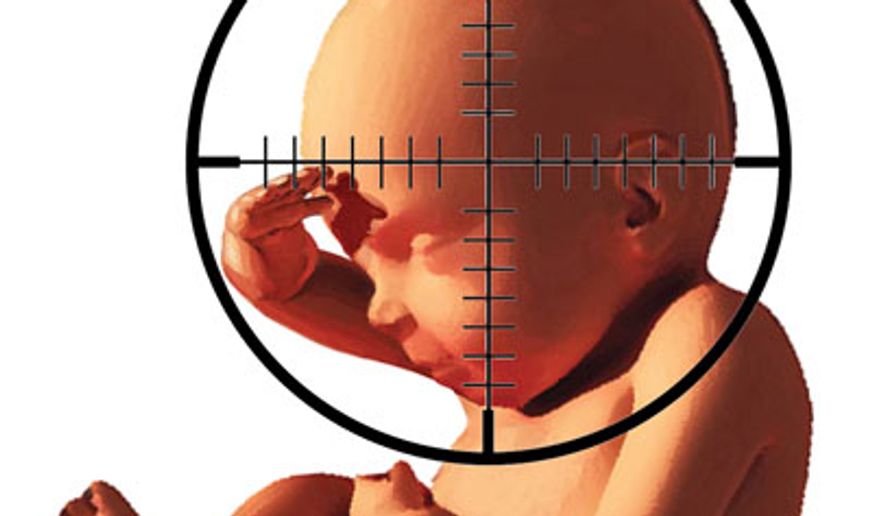OPINION:
The 50-year-old talking points that have dominated the abortion debate are about to become much less relevant as legal conflicts headed to the Supreme Court take fresh approaches.
Many are excited about the Dobbs v. Jackson case that the Supreme Court accepted, which looks at limits on abortion pre-viability, but that’s not the only kind of case advancing. Some states have taken what should be called the Justice Thomas Challenge, limiting abortion to confront the prejudiced views of people such as the eugenicists and racists who founded the Corporate Abortion industry of today. Across America, a discussion of abortion as a tool of oppression against a class of people is underway and in court.
This innovative idea came as a silver lining to a disappointing decision. In a 2019 case out of Indiana, the Supreme Court refused to address the validity of a law that would prohibit abortion based on the preborn baby’s “race, sex, diagnosis of Down syndrome, disability, or related characteristics.” In a concurring opinion, Justice Clarence Thomas noted “(t)his law and other laws like it promote a State’s compelling interest in preventing abortion from becoming a tool of modern-day eugenics.”
He continued, “Given the potential for abortion to become a tool of eugenic manipulation, the Court will soon need to confront the constitutionality of laws like Indiana’s.”
Enter Ohio, which just won in the 6th Circuit Court of Appeals for a law that would not permit an abortionist to commit a procedure if he or she knew the purpose was to get rid of a Down Syndrome diagnosed baby. The judges in the case noted, “The right to an abortion before viability is not absolute.” In a 9-7 decision, the judges concluded that the reasoning applied to the abortion decision matters, and a state’s desire to help people facing prejudice is not out of bounds.
Judge Jeffrey S. Sutton observed, “Today’s case, it seems to me, is Exhibit A in a proof that federal judicial authority over the issue has not been good for the federal courts or for increased stability over this difficult area of law. How did it happen that an anti-eugenics law is not the kind of law that reasonable people could compromise over in the context of broader debates about abortion policy?”
Taking the Justice Thomas Challenge, 12 states in this legislative session addressed the prejudice aimed at certain people, leading to a death sentence in the womb. Those states included Arkansas SB 468, Arizona SB 1457, North Carolina HB 453, South Carolina HB 3872, West Virginia SB 74, Florida HB 1221, Idaho H302, Texas SB 1173 and HB 3760, Wyoming HB 0161, Massachusetts H 2409, Maryland HB 846 and Washington SB 5416.
This is the kind of action that inspires Millennial and Gen Z voters, which is why Students for Life Action engaged on behalf of many of these efforts. As noted in a Students for Life of America poll from earlier this year, the reason given for abortion makes a difference, and more than 7 out of 10 young people wanted limits.
Few communities need more support for a right to life than those with Down Syndrome. Studies indicate that 67 percent of those diagnosed with the genetic condition in the womb are ended with abortion in the United States. But worldwide the numbers go even higher, from 77 percent in France to 90 percent in England to 98 percent in Denmark and almost 100 percent in Iceland.
Those kinds of horrifying numbers represent a mindset that an individual’s value can be determined by the perception of their worth to others.
As a mother with two of four children who have a life-threatening genetic condition, I have endured the prejudice of those who would argue that my children should never have been born because of their medical needs, and I am not alone in that experience.
In today’s medical environment, prenatal testing is pushed for the purpose of prescribing a death sentence for those deemed less than perfect, and extraordinary pressure is applied to mothers by those in the medical profession to end lives before they have had a chance to begin.
In England, where a diagnosis of Down Syndrome permits abortion up to birth, a movement called Don’t Screen Us Out has led to a lawsuit from a woman with Down Syndrome and a young mother, who told reporters “that she was involved in the lawsuit because the law does not value her two sons, one of whom has Down syndrome, equally.”
The roots of this inequality reach far into our history. Writing in the Ohio case, Judge Richard Allen Griffin noted, “Eugenics was the root of the Holocaust and is a motivation for many of the selective abortions that occur today.”
It’s legal subterfuge to pretend that the prejudice against those with Down Syndrome is acceptable before birth but ends after a child takes a breath. Those attitudes carry forward. Discrimination against people based on sex, race or perception of abilities should be condemned whether in the womb or in the boardroom, and with any luck, the Supreme Court will answer the Justice Thomas Challenge with compassion and a day in court.
• Kristan Hawkins is president of Students for Life of America. Follow her @KristanHawkins or subscribe to her podcast, Explicitly Pro-Life.




Please read our comment policy before commenting.